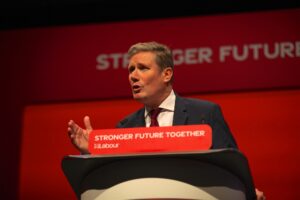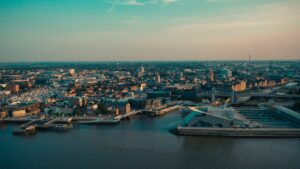His career has tracked 30 years of economic development in north-west England. Now in his first major local authority role, Nick Gerrard tells Clare Goff why we need the private sector like never before

From his wood-panelled office in the 1930s-built Trafford Town Hall, some might say Nick Gerrard has landed one of the cushiest economic development posts in the country.
Named the seventh most resilient economy in England and the enterprise capital of the northwest, Trafford’s fortunes are well-established and on the rise. The pessimistic vision of its economy over the next five years estimates the creation of over 8,000 new jobs.
Within metres of the town hall, the Old Trafford cricket club and the offices of Kellogg’s sum up the twin business and leisure offer behind the borough’s success. Trafford Business Park, the first and still possibly the largest in Europe, houses 1,300 companies and is responsible for 32,000 jobs.
Home to the Imperial War Museum North, a certain well-regarded football club, and a stone’s throw from the Lowry arts centre in neighbouring Salford – tourism in Trafford is worth more than £370m a year. The great and good of the region flock here to live, enticed by its high-performing schools and good housing.
Mr Gerrard, corporate director for economic growth and prosperity, responds to the borough’s ranking with a degree of caution, however. ‘This is no time for complacency. Trafford is not an island. We are a net importer of 25,000 jobs. Trafford has to succeed; its net contribution to Greater Manchester’s prosperity is greater than any other borough in Manchester.’
A large part of its recent success could be claimed by the interventionist policies of previous governments; the Trafford Park Development Corporation was set up by the last Conservative government to develop the business park and quayside area. As public funds run dry and the new government adopts a more ‘hands-off’ approach to business, will Trafford maintain its position?
Mr Gerrard himself worked for the Trafford Park Development Corporation in the 1990s and admits that we are now living in different times.
‘In those days the development corporations were set up because it was deemed to be “in the national interest” that these areas succeeded. We don’t talk like that now. Rather there is a focus on the broader economy within which Trafford Park and other key places sit.’
He is back working in the borough at a time when public spending is being slashed and the private sector called on to fill the gaps. With a comparatively small reliance on the public sector and levels of private sector funding in Trafford which are ‘disproportionately great’, he says the need to invest heavily in the borough’s infrastructure is no longer there, although there are still key infrastructure investments to be made such as the extension of Metrolink into Trafford Park.
Today the local authority’s role is one of a ‘catalyst to bring things together’. Pushing the potential of Trafford Business Park even further is at the top of his ‘to do’ list, but the council’s approach will be one of stewardship, working closely with the park’s major companies to support their investment and growth plans.
He is keen to foster the indigenous investment of those businesses already located in the borough as public subsidies for regeneration disappear. ‘If we didn’t need the private sector before we do now,’ he says.
Boosting the eight town centres in the borough is also one of his top priorities. But again, part of this work is now being taken on by local companies: what began as a public sector exercise with private sector consultation in Altrincham has evolved into a private-sector led town centre strategy group. ‘It’s totally refreshing,’ he says. ‘Normally it’s the private sector being ‘engaged’, but in this case they provided the challenge to the public sector.’
 ‘It’s totally refreshing. Normally it’s the private sector being “engaged”, but in this case they provided the challenge to the public sector.’
‘It’s totally refreshing. Normally it’s the private sector being “engaged”, but in this case they provided the challenge to the public sector.’
To Mr Gerrard, business people get involved where there is a collision of interests. ‘My approach is that you have to listen to them and see where the common ground is. It’s not simply about the local authority saying “this is what needs to be done”.’
Such public/private partnership working could be a model for how the current government wants economic development to be conducted in the future. Manchester’s links with its local private sector are strong: in 2009 the Association of Greater Manchester Authorities (Agma) set up a series of commissions bringing together the public, private and voluntary sectors on issues such as health, planning and housing, including the Commission for the New Economy, where Mr Gerrard previously held the position of deputy chief executive, and the Business Leadership Council.
As other areas around the country attempt to get to grips with the new economic landscape, Greater Manchester has been practicing and perfecting an autonomous city-region model with strong private support for 20 years.
The creation of the Agma in 1986 brought Greater Manchester’s ten local authorities together, and their joint working relationship will be formalised in the country’s first combined authority in April.
He calls the combined authority ‘the ultimate expression of localism’, the benefits of which are now becoming even more apparent. As areas start the process of forging links with neighbouring authorities through local enterprise partnerships (LEPs) and making tentative steps towards shared services, Greater Manchester has long learned the value of a combined approach.
Thus, economic development heads across Greater Manchester councils regularly join forces if it makes sense to do so, sometimes in twos or threes but often as a group of ten.
The £66,000 given to each borough by the last government to produce a local economic assessment were pooled by the Greater Manchester authorities to make the money go further. And now the region’s Regional Growth Fund bids have taken a strategic approach to the whole region.
‘We’ve put in bids for a whole series of schemes based on an investment model. The money will be repaid with a view to it being recycled.’
As well as joint bids for the RGF, a number of local authorities in the region have pooled pension funds and added it to European money from the Jessica fund to create Evergreen, an investment fund that will allow money to go further and open the region up to investment-ready propositions for regeneration.
The shift from a grant-based model of funding economic development and regeneration to one of investment funds is changing the local government approach to regeneration, Mr Gerrard says. ‘It’s a different mindset and different technical skills are needed, skills usually found in the private sector.’
In Manchester collaboration was born out of necessity: when the last Conservative government dismantled the Greater Manchester County Council, it made sense for local authorities to collaborate across boundaries over the likes of policing, waste and transport. He argues that its collective interest has allowed it to evolve and grow over the years.
‘There has to be an underlying rationale to working together. It can’t just be about people getting on because people change. The underlying rationale in Greater Manchester is the economy. It’s in the collective interest to work together.’ The constancy of leadership within the region has helped ease the journey too, he says, as has the publication of the Manchester Independent Economic Review in 2009, which set out an economic narrative for the whole city-region. He is proud of how far it has come.
‘Even if every authority and city-region could have a combined authority I would be very surprised if they were all prepared to vote for the level of collaboration seen in Manchester. I am proud of how local authorities through all sorts of changes and pressures have maintained that constancy.’
Having enjoyed watching the evolution of Manchester’s economy from a central position at the Commission for the New Economy, he is now looking forward to turning strategy into action. One of the boards he set up in his last job – Team Manchester Economic Development Leads – is now something he himself sits on.
Within Trafford Council, economic growth and prosperity forms a fifth directorate, following a structural change last year to elevate its position.
As the council’s programme of cuts is rolled out, the new structure, as well as the combined authority approach, will maintain the borough’s strong focus on economic growth: his division is losing 30 posts, while some processes will now be done electronically to cut costs.
During his 30 years in local economic development he has watched with interest the shift from central to regional and now local control over economic development. The model Manchester has perfected will stand the test of time, he says, but he believes there will be a need for a structure in between the local and the national to compensate for the patchwork of LEPs now rolling out across England.
He is proud to be corporate director of ‘prosperity’ as well as economic growth, having long championed a broader focus to economic development. ‘I’ve never liked the idea of economic development being stuck “over there”. It doesn’t work well in isolation.’
At Trafford Park Development Corporation he fought with central government to move beyond the physical and set up a training institute run by the local universities and major companies to boost skills. The devolution of economic development powers and the ever-broadening focus of the discipline will, he believes, help maintain its importance as we move through difficult times.
‘People said it would be savaged. But there is now a deeper recognition of the interrelationships of what we’re trying to achieve and the need to make resources work across the council.’
While economic development slips off the agenda in some areas, Trafford is forging a new model for its future.

















Leave a Reply